
The Euro Beach Soccer League (EBSL) is the premier competition in beach soccer contested between European men's national teams. The competition has been held annually since its establishment in 1998, making it the oldest beach soccer tournament in Europe and one of the oldest in the world, only surpassed in longevity by the World Cup and Mundialito events. The EBSL was originally created to promote the newly founded sport in Europe in a competitive environment and was originally called the European Pro Beach Soccer League until 2004.
The 2008 Euro Beach Soccer League, was the eleventh edition of the Euro Beach Soccer League (EBSL), the premier beach soccer competition contested between European men's national teams, occurring annually since its establishment in 1998. The league was organised by Beach Soccer Worldwide (BSWW) between June 20 and August 24, 2008.
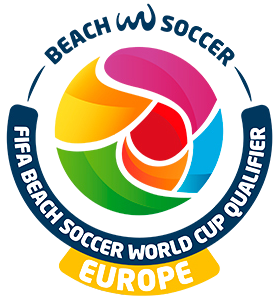
The FIFA Beach Soccer World Cup – Europe qualifier is a beach soccer championship that takes place to determine the nations who will represent Europe at the upcoming edition of the FIFA Beach Soccer World Cup. It is contested between the senior men's national teams of the members of UEFA.
The 2006 Euro Beach Soccer League, was the ninth edition of the Euro Beach Soccer League (EBSL), the premier beach soccer competition contested between European men's national teams, occurring annually since its establishment in 1998. The league was organised by Beach Soccer Worldwide (BSWW) between June 2 and August 27, 2006, in eight different nations across Europe.
The 2007 Euro Beach Soccer League, was the tenth edition of the Euro Beach Soccer League (EBSL), the premier beach soccer competition contested between European men's national teams, occurring annually since its establishment in 1998. The league was organised by Beach Soccer Worldwide (BSWW) between June 29 and August 26, 2007 in six different nations across Europe.
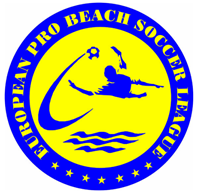
The 1998 Euro Beach Soccer League was the first edition of the Euro Beach Soccer League (EBSL), the premier beach soccer competition contested between men's European national teams, originally known as the European Pro Beach Soccer League at the time. The competition was organised by Beach Soccer Company (BSC), the precursors to Beach Soccer Worldwide (BSWW) who took over organisation in 2001, between June 6 and September 20, 1998 in seven different nations across Europe.
The 2005 Euro Beach Soccer League, was the eighth edition of the Euro Beach Soccer League (EBSL), originally known as the European Pro Beach Soccer League, the premier beach soccer competition contested between European men's national teams, occurring annually since its establishment in 1998. The league was organised by Beach Soccer Worldwide (BSWW) between July 8 and August 28, 2005 in five different nations across Europe.

The 2004 Euro Beach Soccer League, was the seventh edition of the Euro Beach Soccer League (EBSL), originally known as the European Pro Beach Soccer League, the premier beach soccer competition contested between European men's national teams, occurring annually since its establishment in 1998. The league was organised by Beach Soccer Worldwide (BSWW) between July 2 and September 5, 2004 in ten different nations across Europe.
The 2003 Euro Beach Soccer League, was the sixth edition of the Euro Beach Soccer League (EBSL), the premier beach soccer competition contested between European men's national teams, known as the European Pro Beach Soccer League at the time, occurring annually since its establishment in 1998. The league was organised by Beach Soccer Worldwide (BSWW) between June 6 and August 31, 2003 in nine different nations across Europe.
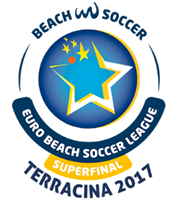
The 2017 Euro Beach Soccer League (EBSL) was the 20th edition of the annual, premier European competition in beach soccer contested between men's national teams, in a league and play-off format.
The 2002 Euro Beach Soccer League, was the fifth edition of the Euro Beach Soccer League (EBSL), the premier beach soccer competition contested between European men's national teams, known as the European Pro Beach Soccer League at the time, occurring annually since its establishment in 1998. The league was organised by Beach Soccer Worldwide (BSWW) between June 1 and September 7, 2002 in nine different nations across Europe.
The 2001 Euro Beach Soccer League, was the fourth edition of the Euro Beach Soccer League (EBSL), the premier beach soccer competition contested between European men's national teams, known as the European Pro Beach Soccer League at the time, occurring annually since its establishment in 1998. The league was organised by Beach Soccer Worldwide (BSWW) between June 1 and September 2, 2001 in seven different nations across Europe.

The 2009 Euro Beach Soccer League, was the twelfth edition of the Euro Beach Soccer League (EBSL), the premier beach soccer competition contested between European men's national teams, occurring annually since its establishment in 1998. The league was organised by Beach Soccer Worldwide (BSWW) between July 10 and August 23, 2009.
The 2006 Euro Beach Soccer League – Last chance bracket, simply known as the Last chance bracket was an additional round of the 2006 Euro Beach Soccer League (EBSL) that was specially organised to determine the fifth and final European nation that would qualify for the 2006 FIFA Beach Soccer World Cup.
The 1999 Euro Beach Soccer League, was the second edition of the Euro Beach Soccer League (EBSL), the premier beach soccer competition contested between European men's national teams, known as the European Pro Beach Soccer League at the time, occurring annually since its establishment in 1998. The league was organised by Beach Soccer Company (BSC) between May 22 and September 20, 1999 in five different nations across Europe.
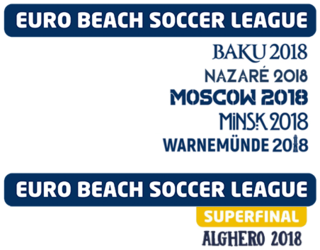
The 2018 Euro Beach Soccer League (EBSL) was the 21st edition of the Euro Beach Soccer League, the annual, premier competition in European beach soccer contested between men's national teams. It was organised by Beach Soccer Worldwide (BSWW), in a league and play-off format.
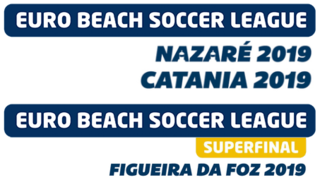
The 2019 Euro Beach Soccer League (EBSL) was the 22nd edition of the Euro Beach Soccer League, the annual, premier competition in European beach soccer contested between men's national teams. It was organised by Beach Soccer Worldwide (BSWW), in a league and play-off format.

The 2020 Euro Beach Soccer League (EBSL) was the 23rd edition of the Euro Beach Soccer League, the annual, premier competition in European beach soccer contested between men's national teams. It is organised by Beach Soccer Worldwide (BSWW).
The 2021 Euro Beach Soccer League was the 24th season of the Euro Beach Soccer League (EBSL), the annual, premier competition in European beach soccer contested between men's national teams. It was organised by Beach Soccer Worldwide (BSWW), in a league and play-off format.
The 2021 Women's Euro Beach Soccer League was the first edition of the Women's Euro Beach Soccer League (WEBSL). It is the annual, premier competition in European beach soccer contested between women's national teams, succeeding the Women's Euro Beach Soccer Cup (2016–19). Organised by Beach Soccer Worldwide (BSWW), it is the women's version of the men's long-running Euro Beach Soccer League, which began in 1998.










